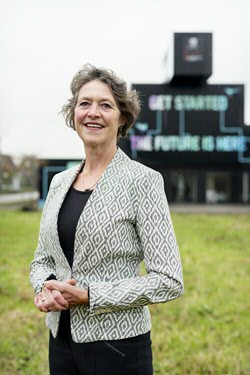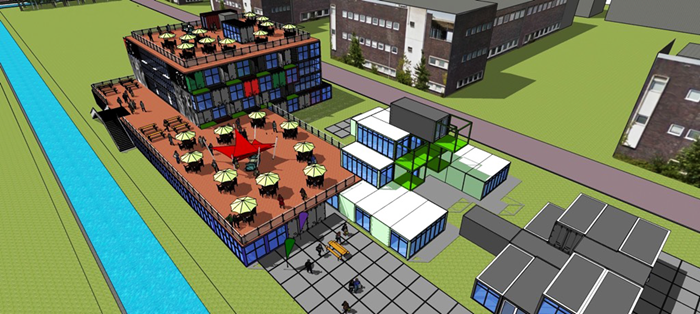Annemieke Galema: ‘People must continue to meet each other’

The peace and quiet of the Groningen countryside on the edge of the Zernike Campus is in sharp contrast to the industry on the campus, where Annemieke Galema reigns supreme over Northern Knowledge, the new knowledge dissemination centre for the UG, the UMCG and Hanze UAS.
Text: Annemieke van der Kolk / Communication
Societal impact
Galema obviously isn’t fazed by the mountains of files surrounding her as she calmly sketches a picture of the developments in her field. ‘Research impact’ means linking science to society and industry. In more concrete terms, it could involve a device that tells you within 12 seconds whether you should watch out for heart problems, recycling lorry tyres to make oil, 5G internet that is 100 times faster than the current 4G, and much, much more. The brochure on Galema’s desk sums it up nicely: adding value to society.
The earthquake factor
Galema has no difficulty defining the added value of knowledge for society: ‘The UG is currently working on the Liveable and Promising Groningen Knowledge Platform’, she tells me excitedly, ‘which utilizes expertise on earthquake issues from the UG, Hanze UAS and the UMCG. Societal institutions such as the Groningen local health authority and CMO STAMM have joined the knowledge partners to study the societal impact of earth movement on aspects such as liveability, health, energy transition, sustainability, the economy, entrepreneurship, and regional aspects including shrinkage and the ageing population. For example, the number of GP consultations in some places in the region has risen significantly in the past few years. What types of problems do these patients have? Are their symptoms physical, mental, both, or do they “just” need someone to listen to them? This is one of the things that Northern Knowledge supports.’
Potato giant on the Zernike Campus
‘Take the potato giant Avebe’, she continues, ‘which has based its Research & Development department here on the Zernike Campus. Why? Because they’ve found something they need here. Avebe is keen to work with knowledge institutions and other parties that will introduce them to valuable new partners. But a university adding value to knowledge is nothing new. Take the science shops; they’ve been around for ages.’ Groningen students use these ‘shops’ as a base for conducting research into knowledge questions emanating from society. ‘And student start-ups have been around for decades. The difference is that we are now crossing the traditional borders of the individual disciplines. This development has really taken hold since the new millennium.’

Less rigid in our disciplines
‘You get a better perspective on certain developments when you’ve been around for a while’, she laughs. ‘At the start of the millennium I remember saying in an interview that we were in a transition period, and that we need to include the region more closely and expand the opportunities for innovation. I can now say with certainty that we’ve moved on. We know where to find each other and we’re able to deploy different disciplines to examine a problem. We are less rigid in our disciplines.’ This also applies to Galema, who started her career as a historian, but broadened her horizons while working on a PhD. ‘I was in Leiden researching Frisian migration to the USA. I approached the motives for migration from a socio-economic angle. Of course the question of why people choose to migrate is a hot item at the moment, but in those days, research into migration from a global perspective was fairly unique. It gave me with a world-wide network, something that’s always been a great help to me in my work.’
No regrets
Galema was a lecturer in the Faculty of Arts, helped to set up the Faculty Placement Office and was then asked to join the Transfer & Liaison Group, a predecessor of the Research & Valorisation department in the UG. She became director of both. ‘I moved from my discipline of history into a multidisciplinary field, into the diversity of research within the UG, and I have never regretted it.’ The next step was Northern Knowledge, a partnership between the UG, Hanze UAS and the UMCG. ‘But’, Galema is keen to add, ‘we don't want to be the three main parties. We want to connect with all the other knowledge institutions, including Van Hall Larenstein University of Applied Sciences, the NHL University of Applied Sciences and of course our own Campus Fryslân. Northern Knowledge really evolved from fragmentation: we were so fragmented that companies didn't know where to find us. We weren’t necessarily trying to set up a new institute, but looking for a way to create more cohesion between research impact and entrepreneurship on the basis of expertise. Now we have to make sure that people can find us, so raising our profile and forging ties are our main priorities.’
Connection is key
The key word in Galema’s story is ‘connection’: ‘I speak to stakeholders every single day – people who want or need something. They might be researchers thinking about applying for a patent or considering going into business with a company.’ But they could also be businesses or government bodies commissioning the UG to carry out a piece of a research. Galema: ‘In 2015, a cargo ship rammed the Friesenbrücke bridge near Weener, just over the border with Germany. This bridge was an elementary link between regions and needed a complete overhaul. However, to make things more complicated, the cruise ships sailing from the nearby Meyer Wharf to the estuary of the River Eems, also need free passage. The UG was asked to conduct research into the societal and economic impact of various solutions, to enable informed decision-making.’
People must continue to meet each other
That is the the essence of her work, Galema thinks: ‘Making sure that people continue to meet each other. At the moment, we’re still in the phase of building up Northern Knowledge so I'm constantly communicating with everyone about what they’re doing.’ And that's a lot of communication as Northern Knowledge rests on five very expansive pillars: entrepreneurship, business development, knowledge transfer, industry relations and campus development. ‘This isn’t a 9 to 5 operation’, adds Galema. ‘Not only because of the technological developments, but also because so many different people and fields are involved. Take the plethora of cultural events, for example. So I don’t really mind constantly jumping on my bike to consult with people somewhere else in the city. It helps me to relax between appointments, particularly now that we’re chipping away at the boundary between work and private life.’
Young women are chomping at the bit
As director of Northern Knowledge, Galema is a woman who has reached the top. ‘I get asked to speak at career events, so I do see myself as a role model. A lot of women work in the innovation sector, but not many of them at the top. Thankfully, this is starting to change. It's important to have a good reflection of society, and to be quite honest, teams with more diversity get more done. Young women are chomping at the bit, but we need to give them space. Together with other women from the UG, I'm looking for opportunities in this respect. We form an informal network and want to think independently. Universities are and must remain a haven for thinkers.’
More news
-
15 September 2025
Successful visit to the UG by Rector of Institut Teknologi Bandung
